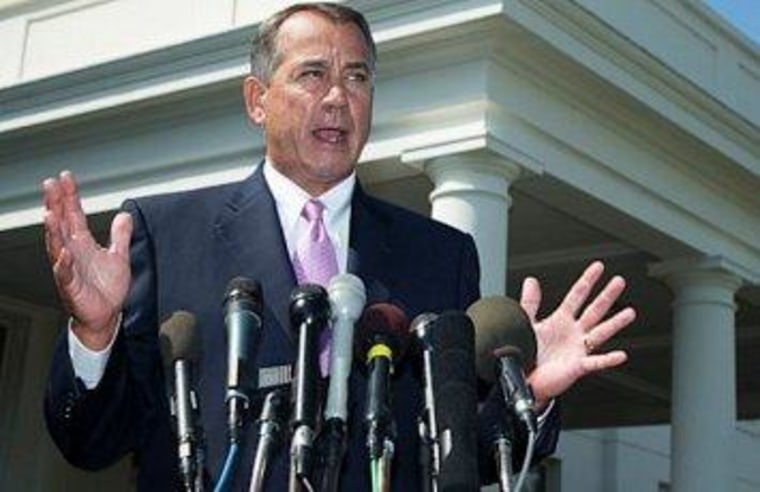"I am going to support the president's call for action," House Speaker John Boehner (R-Ohio) said on Tuesday, in reference to U.S. policy in Syria. "I believe my colleagues should support this call for action."
In the 48 hours that followed, most of Boehner's colleagues from his own party -- which is to say, the members he ostensibly leads -- announced their intention to ignore the Speaker's suggestion.
By some measures, this might raise doubts about Boehner's leadership abilities. The Speaker's office doesn't see it that way.
Speaker John Boehner's (R-OH) office reiterated Friday that it's President Obama's responsibility to sway the public on the need to strike Syria and warned that lawmakers will represent their constituents."The speaker has consistently said the president has an obligation to make his case for intervention directly to the American people," said Boehner spokesman Brendan Buck. "Members of Congress represent the views of their constituents, and only a president can convince the public that military action is required."
Let's put aside, for now, the notion that members of Congress represent the views of their constituents -- an assertion that doesn't seem to apply to how Republicans approach immigration, gun violence, taxes, job creation, entitlements, civil rights, health care, or education.
Instead, let's try to fully appreciate the rules as they've been laid out for the political establishment, because it seems as if the last few days have been devoted to the political establishment and the chattering class planting some goalposts pretty deep.
If congressional Republicans ignore President Obama, it's evidence of Obama failing. If congressional Republicans ignore their own party's leaders, it's still evidence of Obama failing.
If the president bypasses Congress to pursue his national security strategy, he's dictatorial. If he seeks congressional authorization for his national security strategy, he's weak and undermining the stature of his office.
If lawmakers reject a resolution authorizing force in Syria, Obama will struggle to get anything through Congress for the rest of his term. If lawmakers approve a resolution authorizing force in Syria, Obama will struggle to get anything through Congress for the rest of his term.
If the president uses the military to intervene in Syria, Obama will have undermined the credibility of the United States on the global stage. If the president honors a congressional vote against using the military to intervene in Syria, Obama will have undermined the credibility of the United States on the global stage.
I'm starting to think this game is rigged in a heads-I-win; tails-you-lose sort of way.
For what it's worth, while the ultimate outcome on Capitol Hill is in doubt, I'm not at all convinced this is a make-or-break moment for Obama's presidency, and he might as well resign if the votes for his Syria policy don't materialize. Greg Sargent had a compelling piece on the larger context this morning:
If Congress says No, and Obama announces that he will abide by the vote -- arguing that the people have spoken, that democracy and the rule of law will prevail, and that our country will be stronger for it -- then it's very possible that the Dem base will rally behind him.... If Obama heeds Congress, the liberal base -- and liberal lawmakers -- would likely have Obama's back. Independents, who have tilted strongly against an attack, might be supportive, too.And so, several questions for the political science egghead types and anyone else who cares to answer. Do voters really perceive situations like these in the same terms pundits and Congressional lawmakers do, i.e., in terms of what they tell us about presidential strength or weakness? Do voters really expect presidents to bend Congress to their will, or do they see Congress as its own animal and don't hold presidents accountable for its behavior?
I imagine for many political observers, it's easy to think of political "wins" and "losses" in a sports context -- victories are inherently good and defeats are inherently bad. And if the president goes to Congress seeking authorization for a military strike in Syria, and lawmakers reject the appeal, it would be, by definition, a loss for the president.
But it might simultaneously be a win for democracy that leaves the public with the outcome the American mainstream wants. Voters may well react to news organizations obsessing over "Crushing Presidential Defeat on Capitol Hill," but I'm not convinced the public would reflexively see it that way.
If Congress balks and the White House honors the vote, most Americans would be pleased, not outraged, right?
